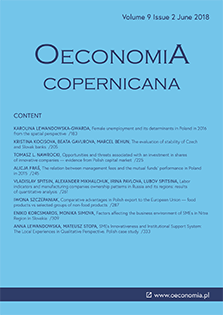The evaluation of stability of Czech and Slovak banks
The evaluation of stability of Czech and Slovak banks
Author(s): Kristína Kočišová, Beata Gavurova, Marcel BehunSubject(s): Methodology and research technology, Transformation Period (1990 - 2010), Present Times (2010 - today), Financial Markets
Published by: Instytut Badań Gospodarczych
Keywords: commercial banks; stability; banking stability index; Z-score; Czech Republic; Slovakia;
Summary/Abstract: Research background: Commercial banks could affect the stability of the whole banking system due to the way they carry out their business activities. The supervision authorities play a key role in protecting banking stability by ensuring banks´ resilience to shocks, ability to recover their position in response to crisis and ultimately the supervision authorities help prevent failure of these banks. Therefore, in recent years’ researchers have been trying to define conditions that could guarantee stability of banks. Purpose of the article: This paper aims to describe the methodology used to measure banking stability, namely banking stability index (BSI) and Z-score. In the first part, we present the literature review, then we try to assess the stability in the condition of the Czech Republic and Slovakia during the period 2006–2016. Methods: The BSI is constructed according to the methodology presented by Ghosh (2011), taking into account the main components, which are described by the set of financial indicators of banks. Findings & Value added: Results showed that the average BSI in the whole sample moved from 0.20454 (in 2015) to 0.2486 (in 2007). The results according to countries have showed that the tendency of development in the Czech and Slovak banking sector was the same. At the beginning of the analyzed period, the Slovak banks were more stable compared to Czech ones. Since 2009 the situation has been different, where the Czech banks could be considered as more stable compared to Slovak ones. The tendency of development of Z-score in both countries could be considered as the same, without the 2009 year, when the Czech banks significantly strengthened their capitalization, which influenced the development of Z-score. The results of correlation analysis between Z-score and BSI pointed to the fact that there was no high correlation between these two measures, therefore it is appropriate to use both methodologies for stability evaluation.
Journal: Oeconomia Copernicana
- Issue Year: 9/2018
- Issue No: 2
- Page Range: 205-223
- Page Count: 19
- Language: English

